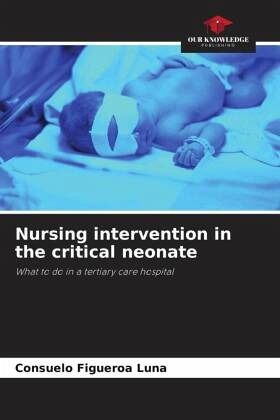
Nursing intervention in the critical neonate
What to do in a tertiary care hospital
Versandkostenfrei!
Versandfertig in 6-10 Tagen
40,99 €
inkl. MwSt.

PAYBACK Punkte
20 °P sammeln!
In the achievements made by our country in the reduction of infant mortality, the care of the newborn child has been of paramount importance. With the development of the Neonatology specialty, the incorporation of valuable technological contributions and the primordial importance of the role played by nursing care to these children in this stage of their life, the most vulnerable, and which requires a specialized and very sensitive staff that remains minutes after minutes next to these little beings who can ask for nothing, but need a lot.It is intended that the student has sufficient, correct...
In the achievements made by our country in the reduction of infant mortality, the care of the newborn child has been of paramount importance. With the development of the Neonatology specialty, the incorporation of valuable technological contributions and the primordial importance of the role played by nursing care to these children in this stage of their life, the most vulnerable, and which requires a specialized and very sensitive staff that remains minutes after minutes next to these little beings who can ask for nothing, but need a lot.It is intended that the student has sufficient, correct and adequate knowledge of the normal physiological characteristics of the healthy newborn, it is precisely knowing the normal as we can distinguish the abnormal and give prompt attention to any neonatological alteration that occurs in the child, from a respiratory distress, to the most common pathologies, among which are: major metabolic disorders, respiratory disorders and in which our correct and timely care is needed, as well as a high degree of sensitivity in providing such care.












